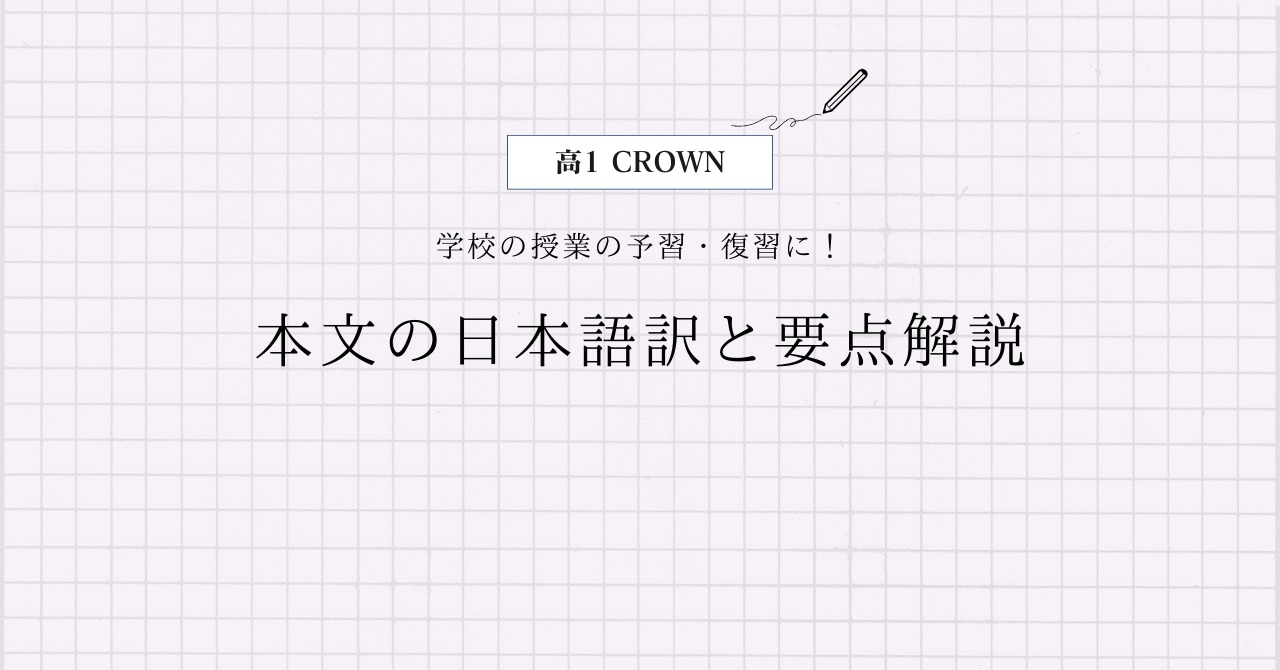三省堂 高1CROWN English Communication1 Lesson10 Section3の本文の日本語訳と重要箇所の解説です。
Section10-1, 10-2, 10-4, 10-5の解説はこちらからご覧ください。
>高1CROWN English Communication1 Lesson10 Section1 本文和訳
>高1CROWN English Communication1 Lesson10 Section2 本文和訳
>高1CROWN English Communication1 Lesson10 Section4 本文和訳
>高1CROWN English Communication1 Lesson10 Section5 本文和訳
- CROWN English Communication1 Lesson10 Section3 本文と日本語訳
- CROWN English Communication1 Lesson10 Section3 重要事項の解説
- In this cartoon, Linus is excited because the home team has won a football game.
- Charlie Brown listens quietly and then asks Linus one simple question:
- “How did the other team feel?”
- Because Charlie Brown has experienced failure himself, he finds it important to be sensitive to the feelings of other people who fail.
- He makes us think of other people.
- In many ways, Charlie Brown is a loser.
- He is not a very good student, and he is not good at sports.
- The pretty little girl in his class pays no attention to him.
- In a world where wealth and power are so important, Charlie Brown is a failure.
- But Charlie Brown never really loses.
- He never feels sorry for himself.
- He always hopes for a better day tomorrow and keeps on trying.
- Perhaps that’s what makes a real winner.
- CROWN English Communication1 Lesson10 Section3 まとめ
CROWN English Communication1 Lesson10 Section3 本文と日本語訳
In this cartoon, Linus is excited because the home team has won a football game.
「この漫画では、地元のチームがフットボールの試合に勝ったので、ライナスは興奮しています。」
Charlie Brown listens quietly and then asks Linus one simple question:
「チャーリー・ブラウンは静かに聞いて、それからライナスに1つの素朴な質問をしました。」
“How did the other team feel?”
『相手チームはどう感じていたのかな?』
Because Charlie Brown has experienced failure himself, he finds it important to be sensitive to the feelings of other people who fail.
「チャーリー・ブラウンは、自分も失敗を経験してきたので、失敗する方の気持ちを思いやることが大切だとわかっています。」
He makes us think of other people.
「彼は私たちに他者について考えさせてくれます。」
In many ways, Charlie Brown is a loser.
「多くの点で、チャーリー・ブラウンは敗者です。」
He is not a very good student, and he is not good at sports.
「彼はあまり優秀な学生ではなく、スポーツも得意ではありません。」
The pretty little girl in his class pays no attention to him.
「彼のクラスにいるかわいい少女は彼を気にも留めません。」
In a world where wealth and power are so important, Charlie Brown is a failure.
「富と権力がとても重要な世界では、チャーリー・ブラウンは出来損ないです。」
But Charlie Brown never really loses.
「しかしチャーリー・ブラウンは本当の意味で負けてはいません。」
He never feels sorry for himself.
「彼は自分のことを哀れだと決して思っていません。」
He always hopes for a better day tomorrow and keeps on trying.
「彼はいつもより良い明日を願って、挑戦し続けます。」
Perhaps that’s what makes a real winner.
「たぶん、そのことが真の勝者にするのです。」

CROWN English Communication1 Lesson10 Section3 重要事項の解説
In this cartoon, Linus is excited because the home team has won a football game.
“cartoon”は「漫画」、“home team”は「地元のチーム」、“football”は「フットボール(サッカー)」という名詞になります。
“excited”は「わくわくした、興奮した」といった形容詞ですね。
また,“excited”, “surprised”, “intersted”のような“-ed”で終わる形容詞は,基本的に主語が「人」のときに使います。
一方で“exciting”, “surprising”, “interesting”のような“-ing”で終わる形容詞は,基本的に主語が「もの」のときに使います。
また、「接続詞because」も使われています。
“won”は“win(に勝つ)”の過去分詞形で、ここでは「現在完了」になっていますね。
“won”は発音が「ワン」なので要注意ですよ!
Charlie Brown listens quietly and then asks Linus one simple question:
“quietly”は「静かに」、“then”は「それから」という副詞です。
“ask 人 もの”で「人にものをたずねる」となって,“ask もの of 人”でも同じ意味になります。
“simple”は「単純な、素朴な、シンプルな」といった形容詞ですね。
“How did the other team feel?”
“other”は「他の、相手の、もう一方の」という形容詞、“feel”は「感じる」という動詞です。
Because Charlie Brown has experienced failure himself, he finds it important to be sensitive to the feelings of other people who fail.
この文では「接続詞because」が使われていますね。
“experience”は「を経験する、体験する」という動詞で、ここでは「現在完了」になっています。
“failure”は「失敗」という名詞です。
“himself”などの“~self”という単語は再帰代名詞と言い,単語の直後や文頭,文末に置くことで強調する役割があります。今回は“Charlie Brown”が強調されて「彼自身」ということです。
“find it 形容詞 to 動詞の原形”は「to以下のことが~だとわかる」という重要表現です。“it”は形式主語で、真の主語は”to”以下の内容になります。
“sensitive”は「微妙な、繊細な、思いやりがある」という形容詞で、“feeling”は「感情、気持ち」という名詞、“fail”は「失敗する」という動詞です。
“of”は前置詞で,”A of B”の形で「BのA」というように後ろから前に訳します。
“who”は「主格の関係代名詞」で,“who fail”が先行詞“other people”を修飾しています。
He makes us think of other people.
“make 人・もの 動詞の原形”で「人・ものに~させる」という使役の意味になります。
“think of~”は「~について考える」という意味ですね。
In many ways, Charlie Brown is a loser.
“in many ways”は「多くの点で」という表現です。
“loser”は「敗者」という名詞ですね。
He is not a very good student, and he is not good at sports.
“not very~”は「あまり~ではない」、“be good at~”は「~が得意だ」という表現ですね。
The pretty little girl in his class pays no attention to him.
“pretty”は「かわいい」、“little”は「小さな」という形容詞ですね。
“pay attention to~”は「~に注意する、注目する」という重要表現で、今回は“no”があるので「~に注目しない、気に留めない」という意味になります。
In a world where wealth and power are so important, Charlie Brown is a failure.
“where”は「関係副詞」で、“where wealth and power are so important”が先行詞“a world”を修飾しています。
“wealth”は「富、財産」、“power”は「権力、力」、“failure”は「失敗した人、出来損ない」といった名詞になります。
“so”は「とても」という、“very”と同じ意味の副詞ですね。
But Charlie Brown never really loses.
“never”は「決して~ない、一度も~ない」という副詞で、“lose”は「負ける」という動詞です。
“really”は「本当に」という副詞で、今回は「本当の意味で」と訳しました。
He never feels sorry for himself.
“feel sorry for~”は「~に申し訳なく思う、~を哀れに思う」といった表現です。
“himself”は「彼自身」という先ほど出てきた再帰代名詞で,主語と目的語が同じになるときは,目的語を再帰代名詞を使って表現します。
He always hopes for a better day tomorrow and keeps on trying.
“always”は「いつも」という副詞ですね。
“hope”は「を望む、願う」という動詞で、“better”は“good”の「比較級」、“day tomorrow”は「明日」という意味になります。
“keep on -ing”は「を続ける」という重要表現で、“on”は無くてもOKです。
“try”は「挑戦する」という動詞ですね。
Perhaps that’s what makes a real winner.
“perhaps”は「たぶん、おそらく」という副詞です。
“that’s what makes A B”は「そのことがAをBにする」という表現になります。この文ではAにあたる単語がないので、「そのことがBにする」でOKです。
この“what”は「関係代名詞」で,“what”1語で“the thing(s) that~(~ということ・もの)”という意味を持ちます。今回は「主格の関係代名詞」ですね。
“real”は「本当の、真の」という形容詞、“winner”は「勝者」という名詞です。
CROWN English Communication1 Lesson10 Section3 まとめ
以上がCROWN English Communication1 Lesson10 Section3の日本語訳となります。
「関係詞」「現在完了」などの使い方をしっかり確認しておきましょう!
>高1CROWN English Communication1 Lesson10 Section1 本文和訳
>高1CROWN English Communication1 Lesson10 Section2 本文和訳
>高1CROWN English Communication1 Lesson10 Section4 本文和訳
>高1CROWN English Communication1 Lesson10 Section5 本文和訳
何か分からない点や他に解説してほしい点があれば,お気軽にコメントしてください!



コメント